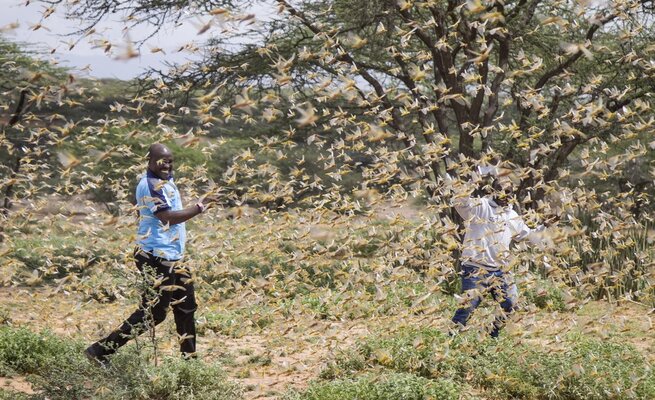Hunger looms in Chilonga as locusts destroy crops

VILLAGERS in the Chilonga area of Chiredzi are staring starvation in a year of good rains after locusts descended on their crops and ravaged them.
The pests attack on their crops inflicted a double kick on the embattled villagers who are facing inevitable eviction from their land by the government as their ancestral land is earmarked for an irrigation scheme.
Chilonga ward seven Agritex officer Excervia Mbiza said the problem of locusts began in February, leaving villagers with very little food stocks.
He said the grains left would not last until the next farming season.
“The locusts mainly affected small grains, which are the main crops here in Region Five. People did not manage to harvest as much as expected,” Mbiza said. But he said people in Chilonga were taught diversified farming under the Zimbabwe Resilience Building Fund-Enhancing Community Resilience and Sustainability (ZRBF-ECRAS) project, which will leave them with something to fall back on.
“ZRBF-ECRAS programmes have taught us that when such disasters come to affect us, we will always have a plan. Now that the small grains have been destroyed, we can still have other avenues of earning money and making sure we have enough to eat,” he said.
Agritex supervisor for Chiredzi district Sibusisiwe Tshuma said the 2020-21 season, especially the months of February and March were plagued by locusts which mainly affected white sorghum.
“Under the ECRAS programme, we encourage farmers to grow small grains as our region is dry and conducive for small grains,” Tshuma said.
Chiredzi headman Fani Chinyeruse said timely intervention by donors would save the community from the damage caused by the locusts.
“ZRBF-ECRAS is empowering people in this area, and lessening the effects of climate change which are usually harsh and always leave us with nothing to fall back on. The help from ZRBF-ECRAS has made it easy for us to survive.”
The ZRBF-ECRAS initiative is supported by the Lands ministry and covers 34 wards and 10 500 households in Chiredzi.
— NewsDay




